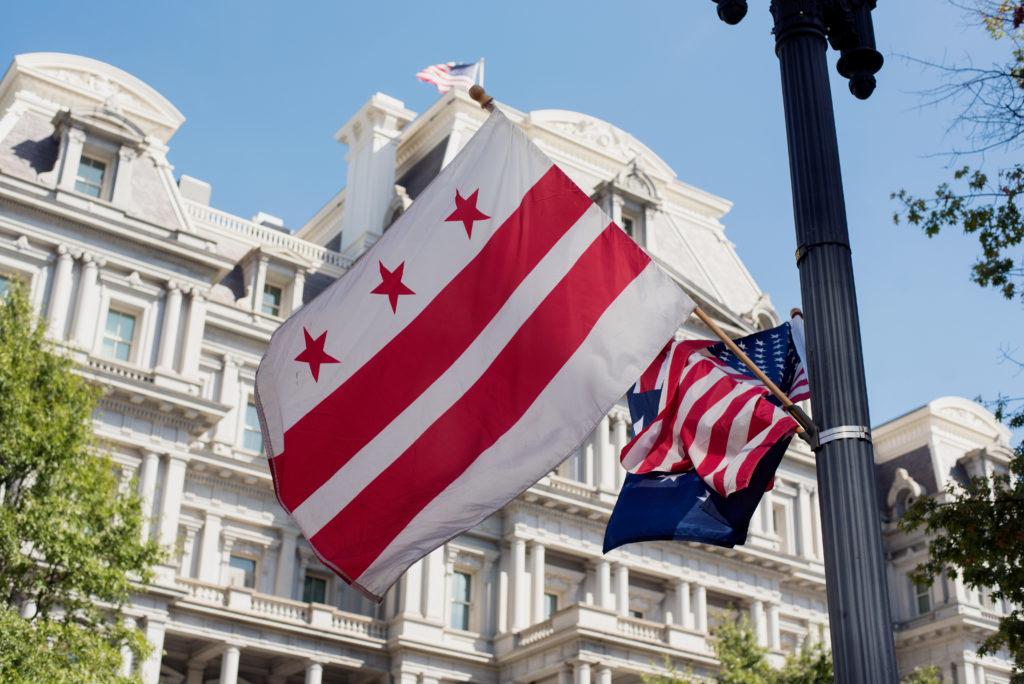Updated: Feb. 4, 2020 at 1:59 p.m.
With Democrats gaining control of Congress and a new president, students say advocates for D.C. statehood have been emboldened with the prospect of establishing the District as the 51st state.
The topic of D.C. statehood has shot to the top of national attention over the past year, after the city received relatively smaller COVID-19 stimulus packages and lacked the authority to call in the National Guard when rioters supporting former President Donald Trump stormed the U.S. Capitol. Matthew Oberstaedt, the president of the GW chapter of Students for D.C. Statehood, said members are using that momentum to increase advocacy efforts by lobbying members of Congress and joining forces with other advocacy organizations.
“We’re closer now than we have been in a long time,” Oberstaedt said. “For the past four years, we had a president who was opposed to this idea, but right now, we have a president and a lot of members of Congress who are really supportive. So I think we’ve got a better chance now than we have in quite a while.”
The U.S. House of Representatives introduced statehood legislation last week after passing a previous version of the bill for the first time ever last year. President Joe Biden has indicated support for D.C. statehood for years.
Oberstaedt said chapter members are writing letters to members of Congress, hosting events with speakers supporting D.C. statehood and encouraging students to write pieces for their local publications in areas across the country that might not be aware of the citywide movement. He said the group also plans to participate in an annual lobby day in February, held virtually this year because of the pandemic, in hopes of generating momentum in Congress.
Obersteadt said he spoke with several congressional staffers who won’t co-sponsor statehood legislation and learned that several have withheld their endorsements because their constituents lack interest in the issue.
“One of the big problems that the D.C. statehood movement faces is that a lot of people around the country don’t realize D.C. residents lack the same rights they do,” he said. “More of them are learning about it due to the events of the past year where it’s been in the news, but it remains a problem.”
The GW chapter is partnering with other student organizations like GW College Democrats and March for Our Lives GW, Oberstaedt said. He said the partnerships involve co-hosting events with speakers and holding letter-writing campaigns.
He said the chapter also would like to work with GW College Republicans if the group is interested.
Even though statehood generally hasn’t received as much Republican support, Oberstaedt said partnering with Republicans can help give the issue the bipartisan support it needs to pass Congress.
He added that chapter members are coordinating via email and GroupMe in light of the pandemic. When students are all on campus, members would normally gather around Kogan Plaza with the D.C. flag to spread information about the cause.
Josiah Reedy, the treasurer of the GW statehood chapter, said he’s a Republican who supports statehood because it upholds national values dating back to the Revolutionary War, fighting against taxation without representation. He said he helped organize an event last fall with conservative speakers from D.C. who also have advocated for the measure to pass Congress.
“We should uphold the values that we fought a revolution a few 100 years over, and we fought for no taxation without representation,” Reedy said. “And that should apply to everyone in the U.S., the people in D.C.”
Republicans led by then-Senate Majority Leader Mitch McConnell quashed Democratic attempts to push a statehood bill through Congress last year as D.C. statehood would likely increase the number of Democratic representatives in the House and U.S. Senate. Reedy said more Republicans are starting to flip in support of statehood after understanding more about the transition to a state government and the benefits of additional state funding.
“Coming from a Republican perspective, usually it’s the kind of issue that Republicans aren’t necessarily big fans of D.C. statehood, but usually they don’t want to necessarily talk about it that much because it’s not like one of those issues that is going to look really good to be against,” he said.
Del. Eleanor Holmes Norton, a Democrat and the District’s non-voting member of Congress, introduced the most recent statehood bill to the 117th Congress last month, gathering 202 cosponsors – the most statehood has ever received. Republicans are expected to block a Senate vote with a filibuster, so statehood would need 60 senators to pass the bill.
“This is the most important bill I introduce each Congress, and it made historic strides in the last Congress,” she said in her introductory statement for the bill. “District residents have always been citizens of the United States and pay more federal taxes per capita than the residents of any state but are the only federal income taxpaying Americans who do not have full and equal citizenship rights. The denial of local control on local matters and of equal representation in Congress can be remedied only by statehood.”
Cleo Hudson contributed reporting.
This post has been updated to correct the following:
An earlier version of this story stated that the GW chapter has partnered with GW College Republicans to host events. The chapter is hoping to partner wit CRs in the future.







